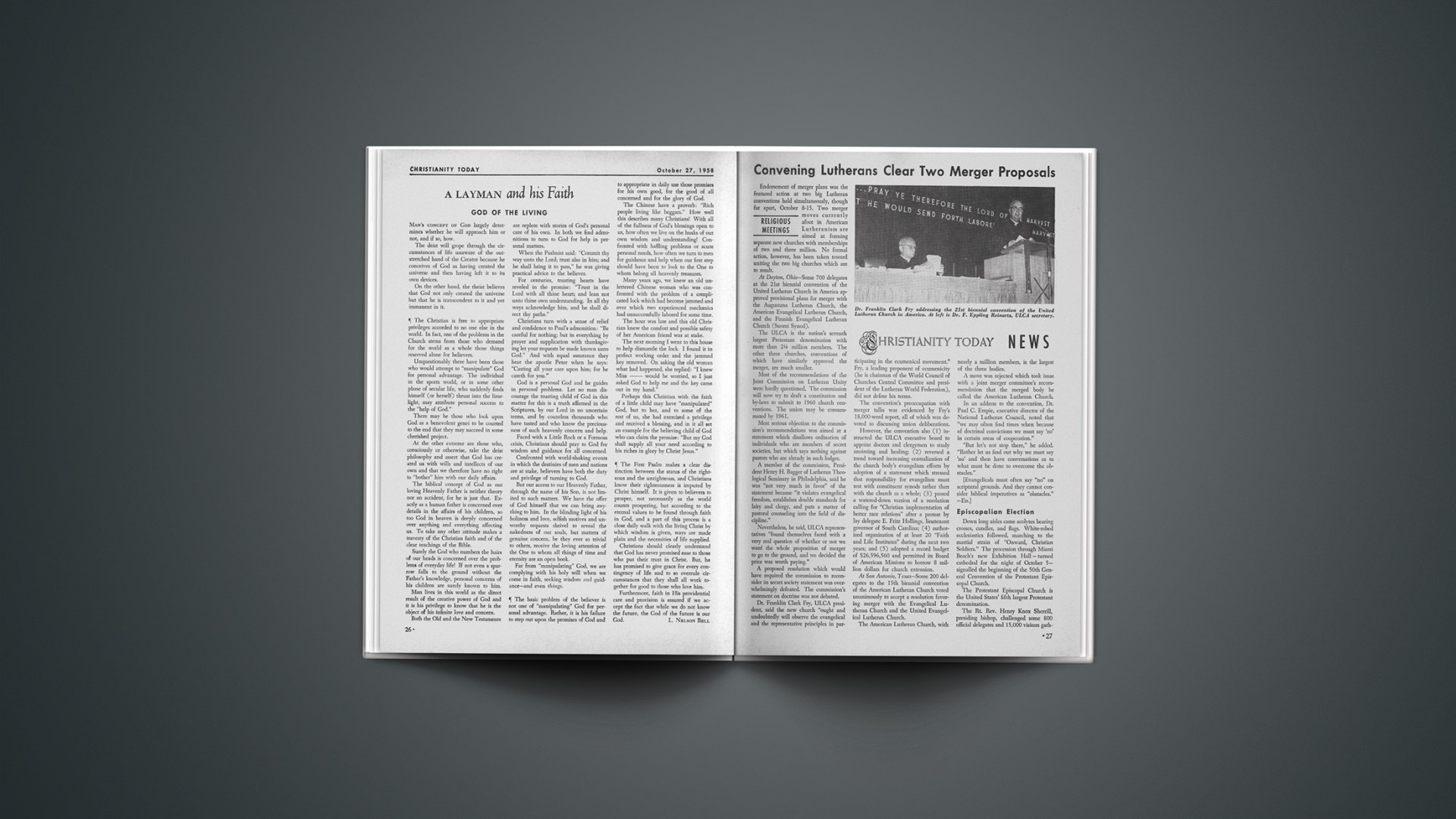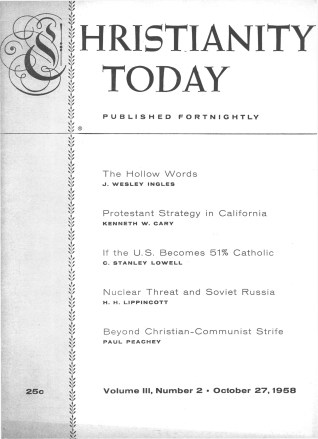Man’s concept of God largely determines whether he will approach him or not, and if so, how.
The deist will grope through the circumstances of life unaware of the outstretched hand of the Creator because he conceives of God as having created the universe and then having left it to its own devices.
On the other hand, the theist believes that God not only created the universe but that he is transcendent to it and yet immanent in it.
The Christian is free to appropriate privileges accorded to no one else in the world. In fact, one of the problems in the Church stems from those who demand for the world as a whole those things reserved alone for believers.
Unquestionably there have been those who would attempt to “manipulate” God for personal advantage. The individual in the sports world, or in some other phase of secular life, who suddenly finds himself (or herself) thrust into the limelight, may attribute personal success to the “help of God.”
There may be those who look upon God as a benevolent genei to be courted to the end that they may succeed in some cherished project.
At the other extreme are those who, consciously or otherwise, take the deist philosophy and assert that God has created us with wills and intellects of our own and that we therefore have no right to “bother” him with our daily affairs.
The biblical concept of God as our loving Heavenly Father is neither theory nor an accident, for he is just that. Exactly as a human father is concerned over details in the affairs of his children, so too God in heaven is deeply concerned over anything and everything affecting us. To take any other attitude makes a travesty of the Christian faith and of the clear teachings of the Bible.
Surely the God who numbers the hairs of our heads is concerned over the problems of everyday life! If not even a sparrow falls to the ground without the Father’s knowledge, personal concerns of his children are surely known to him.
Man lives in this world as the direct result of the creative power of God and it is his privilege to know that he is the object of his infinite love and concern.
Both the Old and the New Testaments are replete with stories of God’s personal care of his own. In both we find admonitions to turn to God for help in personal matters.
When the Psalmist said: “Commit thy way unto the Lord; trust also in him; and he shall bring it to pass,” he was giving practical advice to the believer.
For centuries, trusting hearts have reveled in the promise: “Trust in the Lord with all thine heart; and lean not unto thine own understanding. In all thy ways acknowledge him, and he shall direct thy paths.”
Christians turn with a sense of relief and confidence to Paul’s admonition: “Be careful for nothing; but in everything by prayer and supplication with thanksgiving let your requests be made known unto God.” And with equal assurance they hear the apostle Peter when he says: “Casting all your care upon him; for he careth for you.”
God is a personal God and he guides in personal problems. Let no man discourage the trusting child of God in this matter for this is a truth affirmed in the Scriptures, by our Lord in no uncertain terms, and by countless thousands who have tasted and who know the preciousness of such heavenly concern and help.
Faced with a Little Rock or a Formosa crisis, Christians should pray to God for wisdom and guidance for all concerned.
Confronted with world-shaking events in which the destinies of men and nations are at stake, believers have both the duty and privilege of turning to God.
But our access to our Heavenly Father, through the name of his Son, is not limited to such matters. We have the offer of God himself that we can bring anything to him. In the blinding light of his holiness and love, selfish motives and unworthy requests shrivel to reveal the nakedness of our souls, but matters of genuine concern, be they ever so trivial to others, receive the loving attention of the One to whom all things of time and eternity are an open book.
Far from “manipulating” God, we are complying with his holy will when we come in faith, seeking wisdom and guidance—and even things.
The basic problem of the believer is not one of “manipulating” God for personal advantage. Rather, it is his failure to step out upon the promises of God and to appropriate in daily use those promises for his own good, for the good of all concerned and for the glory of God.
The Chinese have a proverb: “Rich people living like beggars.” How well this describes many Christians! With all of the fullness of God’s blessings open to us, how often we live on the husks of our own wisdom and understanding! Confronted with baffling problems or acute personal needs, how often we turn to men for guidance and help when our first step should have been to look to the One to whom belong all heavenly treasures.
Many years ago, we knew an old unlettered Chinese woman who was confronted with the problem of a complicated lock which had become jammed and over which two experienced mechanics had unsuccessfully labored for some time.
The hour was late and this old Christian knew the comfort and possible safety of her American friend was at stake.
The next morning I went to this house to help dismantle the lock. I found it in perfect working order and the jammed key removed. On asking the old woman what had happened, she replied: “I knew Miss ——— would be worried, so I just asked God to help me and the key came out in my hand.”
Perhaps this Christian with the faith of a little child may have “manipulated” God, but to her, and to some of the rest of us, she had exercised a privilege and received a blessing, and in it all set an example for the believing child of God who can claim the promise: “But my God shall supply all your need according to his riches in glory by Christ Jesus.”
The First Psalm makes a clear distinction between the status of the righteous and the unrighteous, and Christians know their righteousness is imputed by Christ himself. It is given to believers to prosper, not necessarily as the world counts prospering, but according to the eternal values to be found through faith in God, and a part of this process is a close daily walk with the living Christ by which wisdom is given, ways are made plain and the necessities of life supplied.
Christians should clearly understand that God has never promised ease to those who put their trust in Christ. But, he has promised to give grace for every contingency of life and to so overrule circumstances that they shall all work together for good to those who love him.
Furthermore, faith in His providential care and provision is assured if we accept the fact that while we do not know the future, the God of the future is our God.










